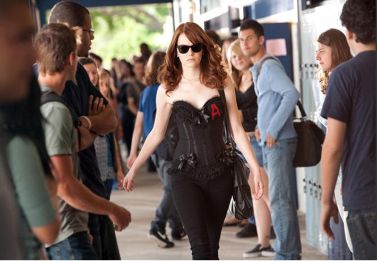 Modern day ‘Scarlet Letter’ adaptation tells teenage tale of the promiscuous girl that wasn’t
Modern day ‘Scarlet Letter’ adaptation tells teenage tale of the promiscuous girl that wasn’t
In general, I am not a fan of trite expression. I’m the sort that spends lunchtime plotting its demise, but after watching ‘Easy A’ I was flabbergasted at how much clichés can teach. I’m going to have to eat my words.
The stereotypical Ojai High School provides the backdrop for Olive Penderghast (Emma Stone), the average student with a highly average reputation—so average that “Google Earth wouldn’t be able to find her if she dressed up as a ten-story building.”
 One day, average goes awry when her friend Rhiannon (Aly Michalka) demands to know how her (imaginary) date went. In actuality, Penderghast spent the weekend dancing with her dog to the sounds of “Pocketful of Sunshine” coming from inside a singing Hallmark card. Tired of her friend’s incessant nagging, she invents a fairy-tale about doing…it. And from there cliché after cliché is piled up into the life and lies of Penderghast.
One day, average goes awry when her friend Rhiannon (Aly Michalka) demands to know how her (imaginary) date went. In actuality, Penderghast spent the weekend dancing with her dog to the sounds of “Pocketful of Sunshine” coming from inside a singing Hallmark card. Tired of her friend’s incessant nagging, she invents a fairy-tale about doing…it. And from there cliché after cliché is piled up into the life and lies of Penderghast.
There is the sympathetic English teacher, Mr. Griffith (Thomas Church), whose class is reading “The Scarlet Letter,” which mirrors the events taking place in Penderghast’s life. Then, there’s the evil-but-seemingly-nice it-girl, the devout Christian Marianne Brian (Amanda Bynes), who is fighting Penderghast and her scandalous new reputation. And then there are the quirky but well-meaning parents, Rosemary and Dill Penderghast (Patricia Clarkson, Stanley Tucci) that are clueless for the larger part of Penderghast’s self-destruction. Almost every role has its own cliched part of the whole.
After protecting her gay friend’s reputation by helping prove him straight, everyone wants a piece of her. Guys offer her money, gift cards and coupons in some cases, to pretend that she has fooled around with them. At first, Penderghast doesn’t refuse because she has experienced the pain of oblivion, the hellhole that is high school. She gets used to the attention, and lets it go on until she loses her “exit strategy” from her promiscuous alter ego, as guidance counselor Mrs. Griffith (Lisa Kudrow) puts it.
‘Easy A’ has the drama, betrayal and redemption of “The Scarlet Letter”—but it lacks the direction. Between Olive’s overdone sarcasm and the melodrama of her entire situation, it is clear how lost she is. You don’t see it when people are raising protest signs against her alleged evil-doings, but when she really starts to believe all the things people say about her. You feel sorry for her even when she’s not crying. Extra credit to Stone for not needing crocodile tears to make the audience cry.
Aside from Stone, very few actors give noteworthy performances. Bynes and Tucci elicit some good laughs, but the rest of the characters are kind of floating through the trite but cleverly worded script—none of them really makes an imprint on the mind.
Taking an old story, infusing it with high-school stereotypes and tweaking shouldn’t normally work. There are probably episodes of “Secret Life of the American Teenager” with a more believable plot. But I’m willing to make an exception because of the idiosyncratic characters and, well, all of the bits that make life what it is—sitting on the hood of an SUV, crushing ice cream cones in people’s faces and watching Huckleberry Finn, the one book we all read in English class that doesn’t happen in real life, happen in real life. And with a little movie magic, director Will Gluck proves that clichés are clichés for a reason—because they happen to people.
You’ll have to see it to believe it. And that’s the pure, unadulterated truth.
{cc-by-nc-sa}





